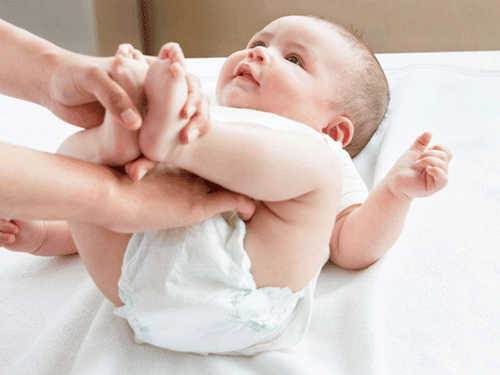This article has professional advice from Dr. Nguyen Thai Ngoc Chau - Specialist in Neonatology - Pediatrics - Department of Neonatology - Vinmec Phu Quoc International Hospital.
A 2-month-old baby is in the transitional stage between birth and childhood. The baby adapt life outside the womb, has absorbed nutrients, and eliminated waste through urine and feces. Therefore, a problem that many mothers are concerned about is how often a 2-month-old baby should have bowel movements.
1. Characteristics of defecation in 2-month-old babies
The digestive system of 2-month-old babies is basically stable, however, the mechanism of this system is not yet complete, so the frequency of defecation of 2-month-old babies is not really stable, sometimes they go many times but sometimes they go very little. Normal characteristics in babies include:
Trắc nghiệm: các chỉ số cần chú ý về sự phát triển thể chất của trẻ
Chiều cao, cân nặng của bé ở từng giai đoạn nên là bao nhiêu là bình thường, bao nhiêu là bất thường? Cùng ThS.BS Ma Văn Thấm điểm lại xem bạn đã nắm được các chỉ số phát triển thể chất của bé chưa nhé!The following content is prepared under supervision of Thạc sĩ, Bác sĩ y khoa, Ma Văn Thấm , Nhi , Phòng khám Đa khoa Vinmec Dương Đông(Phú Quốc)
1.1.The color of a 2-month-old baby’s stool is a key indicator of digestive health and is influenced by the type of milk the baby consumes:
Breastfed baby feces: Stool is light yellow or green, slightly viscous and creamy in texture but sometimes loose like diarrhea, with tiny foamy residue, but this is still normal, not a disease.
If the baby's feces are light green and foamy in the diaper,it may indicate that this baby is getting too much foremilk (low-calorie milk and often before the first feeding) and not enough hindmilk (formula, milk with more fat) or simply that mothers are not feeding their infants enough.
Formula-fed baby feces: Formula-fed baby poop is as thick as peanut butter, dark brown, yellow-brown, green-brown, and especially has a stronger odor than breastfed baby poop.
1.2. General condition of the child: In some cases, the digestive system of a 2-month-old baby may appear loose or purple, mustard green, etc. However, if the baby's overall condition is normal (no fever, fussiness, etc.), then there is nothing to worry about because the infant's body is still developing normally.
2. Frequency of bowel movements of 2-month-old babies
The number of bowel movements of 2-month-old babies depends on many factors, such as the baby's general physical condition, the nutritional quality of breast milk or formula, the way the mother breastfeeds the baby, and last but not least, the mother's health.
2.1. Frequency of defecation of 2-month-old babies who are exclusively breastfed: In 2-month-old babies who are exclusively breastfed, the number of times they defecate light purple stool is 2-3 times/day is normal, the frequency of defecation is normal. This stage lasts until the baby is 3-4 months old.
Although the number of defecation times of 2-month-old babies can be more than 4-5 times/day, if the baby's body does not show any abnormal signs such as high fever or fussiness, it is still considered normal.
2.2. Frequency of defecation of 2-month-old babies who are exclusively formula-fed: In 2-month-old babies who are exclusively formula-fed, the number of defecation times is less, about 1-2 times/day, the stool is quite tough and solid, with a foul odor. In particular, when babies are formula-fed, they are more likely to be constipated than breast-fed babies and sometimes they do not defecate all day. However, mothers do not need to rush to take their children to seek medical attention because this is a normal phenomenon.
3. Some abnormal in children's bowel movements
Children with diarrhea: At this time, the child's stool is characterized by loose stools, no blood or phlegm, more frequent urination, and increased number of bowel movements.
Children with constipation: Constipation is when the child has not had a bowel movement for 5 days or has small stools like rabbit droppings, lumpy, dry, hard, making the child fussy and uncomfortable when going to the toilet.
Green stools: In newborns, stools are normally green, but green stools in 2-month-old children can be due to using the wrong type of milk.
Pale stools: White, pale stools may signal liver or gallbladder issues, the cause needs to be found early for timely treatment.
4. How to care for children to defecate normally
4.1. For children who are exclusively breastfed:
A good diet and breastfeeding method of the mother will help stabilize and normalize the frequency of bowel movements of a 2-month-old child:
The mother's diet should be rich in fiber, vitamins, and minerals. The goal is to provide nutrition for the child and increase intestinal motility to make bowel movements easier. The mother should drink enough water every day. Limit stimulants such as tea, coffee, and carbonated soft drinks. If the child's stool is light green, the mother should feed the child enough milk, drink plenty of energy-rich milk, and pour out the first-line breast milk before feeding the child. Make sure is feeding adequately by switching breasts, finish one side before switching to the other.
4.2 For children who are formula-fed
The amount of formula should be divided into many meals, making it easier for the child to digest as well as ensuring enough nutrition for the child's body to develop at 2 months old. Avoid feeding the child too much at one time. It is necessary to thoroughly sterilize the milk preparation equipment and do hand hygiene with soap when preparing to feed the baby because these are risk factors that increase the risk of gastrointestinal infections in formula-fed babies. Some babies react badly to the type of formula they are using, causing their bodies to not develop fully. In this case, parents need to take their children to see a doctor for appropriate changes and to supplement their energy for better development. Prepare formula properly; avoid mixing too much formula with too little water because it can cause constipation in 2-month-old babies.
Please dial HOTLINE for more information or register for an appointment HERE. Download MyVinmec app to make appointments faster and to manage your bookings easily.















